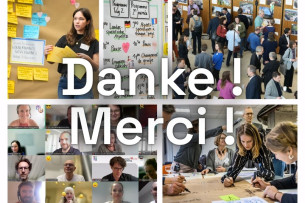Energy-Efficient Renovation for Affordable Housing

On March 26, 2025, the Franco-German Forum for the Future hosted an expert discussion at the European Committee of the Regions in Brussels, focusing on the intersection of energy-efficient building renovation and the EU’s escalating housing crisis. The event brought together local practitioners, EU policymakers, and civil society representatives to explore actionable solutions for addressing these dual challenges.
At the centre of the discussion was the interaction between local solutions and EU policies. Rachel Lancry Beaumont, head of the Unit for Territorial Cohesion Policy (COTER) at the European Committee of the Regions, emphasized that "Local and regional authorities are responsible for the implementation of around 70% of EU legislation". As carriers of local knowledge, the local level has significant potential to inform the broader EU strategies addressing the energy and the housing crises. With the EU Affordable Housing strategy scheduled to be launched in 2026, event participants stressed that the discussion’s insights must be amplified and disseminated to ensure that these lessons can inform the EU’s strategy. Particular emphasis was placed on financing models and governance approaches for energy renovation that enable, rather than hinder, affordable housing — approaches that need to be shared, further developed, and supported at the EU level.
The Context: The Crisis and Its Urgency
Europe’s housing crisis has reached a critical juncture. Over 10% of urban households currently spend more than 40% of their income on housing, while rents have surged by 26% since 2010. At the same time, the climate crisis demands urgent action: the building sector accounts for nearly 40% of the EU’s CO₂ emissions, underscoring the need for large-scale energy renovations. The war in Ukraine has further exposed vulnerabilities in energy security, making the link between affordable housing and sustainable energy policies even more apparent.
In response to the housing crisis, the EU has appointed its first Commissioner responsible for both Energy and Housing and has set up a special parliamentary committee on the housing crisis. Alongside the revised Energy Performance of Buildings Directive (EPBD), these measures form the key instruments for developing the upcoming EU Affordable Housing strategy, which will integrate energy considerations into its approach to the housing crisis.
Local Inspirations
The event highlighted two pioneering initiatives with which the Forum for the Future collaborated in developing policy recommendations on local strategies for energy renovation and socially just energy renovations. These initiatives demonstrate how local innovation can inform EU-wide strategies:
1. Chemnitz, Germany: A District-Level Approach
In Chemnitz, a comprehensive renovation strategy transformed the declining neighborhood of Brühl into a model of sustainable urban development. Supported by Germany’s KfW 432 program and urban development funding, 90% of buildings were retrofitted, a low-temperature heating network was installed, and vacancy rates dropped significantly. Central to this success were the neigbourhood-based approach, which harnessed diverse synergies, the integration of various funding sources, the flexibility of the KfW programme’s funding, data-driven planning strategies and close collaboration with local stakeholders. Despite its success the KfW programme was discontinued in 2024 due to budget cuts. Grit Stillger, Head of the Urban Renewal Department of the City of Chemnitz, stressed the need for Germany and the EU policies to support similarly flexible and locally adaptable programmes to advance comprehensive district-based strategies that integrate energy renovation and the use of vacant housing.
Discover more about KfW 432 in our dedicated Factsheet.
2. Oktave, France: A One-Stop-Shop model for Efficient Renovation
In eastern France, the Oktave initiative—part of the SERAFIN network—simplifies energy retrofits for homeowners. Gabriel Quentin, Partnerships Manager at Oktave in Grand Est Region, presented the initiatives’s comprehensive approach. By offering end-to-end support — from technical advice and assistance in securing subsidies and credit to coordinating contractors — Oktave reduces bureaucratic hurdles and financial risks. Other one-stop shops in the SERAFIN network can prefinance state subsidies and are authorized to grant loans. The revised EU Energy Performance of Buildings Directive (EPBD 2024), which mandates one-stop-shops for every 80,000 inhabitants, reflects the potential of this model. Implemented as comprehensively as in the SERAFIN network, one-stop shops can significantly contribute not only to energy renovation but also to supporting low-income households by helping finance their renovation projects.
Discover more about One-Stop-Shops and the SERAFIN network in our dedicated Factsheet.
Social Safeguards: low-income households in Energy Renovations
The Initiatives highlighted here connect back to the EPBD – a central tool for driving energy renovation. Its latest version is particularly important because, for the first time, it includes a social component. Ciaran Cuffe, former Member of the European Parliament and 2024 EPBD Rapporteur, emphasized the centrality of social safeguards in the updated directive: “we placed a strong emphasis on ensuring that the vulnerable are protected”. Furthermore, he stressed the need to address critical challenges such as prioritizing renovations in the worst-performing buildings—where low-income residents often face unsustainable energy costs—, preventing ‘renoviction’ (displacement due to rent increases after renovation), and securing equitable financing models to shield vulnerable households from undue financial burdens.
Examples from Germany and France highlight actionable pathways to tackle these issues. In Germany, a so-called Drittelmodell is being proposed, which seeks to distribute renovation costs equally among landlords, the state, and tenants, balancing affordability with sustainability incentives. Meanwhile, France’s Ma Prime Rénov’ initiative offers lower-income households subsidies covering up to 80% of renovation costs, significantly easing financial barriers to energy-efficient housing.
Local authorities need instruments that allow them to manage their strategies in a socially just way. The inclusion of this aspect in the EPBD is an important first step and should also be included in further EU-wide strategies—such as the Affordable Housing plan—so that Member States have a directive to align their climate action with social equity.
Financial Models for socially just housing
The discussion also underscored the urgency of financial models that prevent renovation costs from burdening tenants. Barbara Steenbergen of the International Union of Tenants stressed that “in 21 EU member states, the costs for energy renovation can be directly passed on to tenants”, a systemic challenge requiring EU-wide solutions. While Germany’s Drittelmodell and France’s Ma Prime Rénov’ exemplify equitable cost-sharing frameworks, the EU offers promising instruments for scaling these approaches EU-wide: the upcoming Social Climate Fund to subsidize housing needs and the European Investment Bank’s planned expanded affordable housing financing tool. The Elena Facility (European Local Energy Assistance), also managed by the European Investment Bank, provides grants for technical assistance to municipalities planning district-level renovations (e.g., feasibility studies, financing strategies).
The various instruments and proposals show that there is a broad range of knowledge - be it at local, national or European level. The challenge is not to find solutions, but to get into action. One clear recommendation voiced during the discussion was the reactivation of successful programmes such as KfW 432, which exemplify how adaptable, locally integrated models can drive district-level transformation. Serena Pontoglio, Team Leader for Buildings Policy and Renovation Wave Implementation at DG ENER in the European Commission, pointed out, "we are really now in the implementation phase", emphasizing the necessary shift from policy development to the concrete application of existing solutions.
Event Resources
- Policy Recommendations of the Forum for the Future: Strenghtening Local Strategies | Socially Just Renovations
- One Pager: Energy Renovation for Affordable Housing
- Factsheet: KfW 432 program
- Factsheet: One-Stop-Shops





